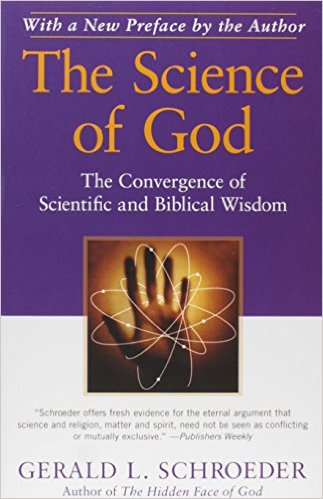Book Review: The Science of God
The Science of God:
The Convergence of Scientific and Biblical Wisdom
by Gerald L. Schroeder
Review by DuWayne Worthington
In The Science of God, distinguished physicist and biblical scholar Gerald L. Schroeder presents fascinating parallels between a variety of biblical teachings and the findings of biochemists, paleontologists, astrophysicists, and quantum physicists. The main thesis of this book is that there is a convergence between modern scientific discoveries and the ancient wisdom of the Old Testament. While Schroeder does not claim either “that current scientific opinion can explain the workings of all the events described in [the Old Testament]” or “that [Old Testament] wisdom foresaw all that modern science has discovered,” he does claim that “in biology, paleontology, cosmology, among a sweep of topics, the confluence is remarkable.”
These claims about “convergence” and “confluence” are rather vague, but there is no vagueness in many of the subsidiary statements which Schroeder makes. Here is a quick summary:
(1) The first thirty-one chapters of Genesis provide a succinct summary of the main elements of Big Bang cosmology, complete with mention of inflation, quark confinement, and various other esoteric physics ideas.
(2) The first chapter of Genesis tells us that life appeared on earth immediately after the appearance of liquid water, just as the fossil record confirms.
(3) Archaeopteryx—a bird-like dinosaur—is referred to in Leviticus.
(4) Dinosaurs are mentioned in the first chapter of Genesis.
(5) Prehuman hominids are referred to indirectly in several passages in the Bible.
(6) Quantum indeterminacy explains how freedom of the will is possible.
(7) The theory of relativity explains how God can be outside of time.
(8) The theory of relativity explains how the six days of Genesis are in fact fifteen billion earth years.
(9) Difficulties which face standard evolutionary accounts of the origins of life strongly indicate that the evolution of life was preprogrammed by an intelligent designer.
There are things to admire in this book. Schroeder writes well, and his views are made perfectly clear. Much of the book can be read as an extended development of the claim that the universe appears to have been incredibly finely tuned for human life. Part of the evidence for this claim comes from recent work on the early history of the universe, and part of the evidence comes from difficulties which have recently confronted orthodox neo-Darwinian accounts of the origins of life on earth.
There is also plenty to disagree with in this book. While it is clear that Schroeder knows some areas of science well, and while it is also plain that he has an extensive knowledge of some areas of biblical interpretation, a number of his claims about science and biblical interpretation can be contested. He simultaneously embraces both general relativity and quantum mechanics to support different arguments, but these two ideas are opposed to each other. One must be incorrect, and so any biblical significance attached to the proved incorrect will be upended in the future.
Schroeder has a very creative way of reconciling Genesis with current science. In effect, he says that both a six-day reading of Genesis and the idea that the universe is 15 billion years old are simultaneously right. This could be called “Time Dilation Creationism.” As the universe expanded, so did time. What looks today to be 15 billion years only took six days back then. Schroeder believes macroevolution is not possible and that intelligent design arguments show this to be true. He embraces evidence in geology that points to an old earth, yet God created all the organisms. He believes Adam to be the first “ensouled” human being so he argues that the biblical account picks up the story of creation near the end of human development. While Schroeder demonstrates respect for both faith and science, it is unlikely his arguments will convince many scientists or theologians.

